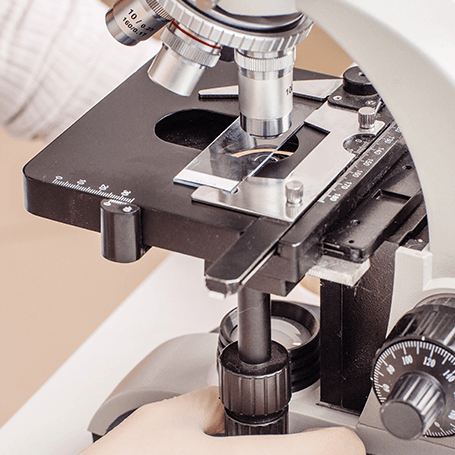
Laboratory
Within our own lab, our staff can perform a variety of routine procedures including fecal samples, urinalysis, blood smears, ear smears, fine needle aspirates, and skin scrapings. We also offer Complete Blood Counts (CBC), blood chemistries, electrolytes, heartworm/tick-borne disease tests, and FeLV/FIV tests.
Commercial and specialty veterinary laboratories are also utilized for specialized diagnostics and consultations such as histopathology, advanced blood chemistry tests, and cultures.
Depending on your pet’s current health status, breed, age, and gender, our veterinarians may recommend different laboratory tests, such as:
Chemistry Panel
This test is important because it gives insight into how your pet’s organs are functioning including the kidneys, liver, and pancreas. It may be recommended to obtain a baseline (or normal values) for your pet so that changes in these values can be monitored to help diagnose future illnesses.
Complete Blood Count (CBC)
This test is commonly used to measure the number of red blood cells, white blood cells, and platelets. This gives our veterinarians valuable information that allows them to diagnose infection, anemia, and leukemia and clotting problems and assess how well your pet is responding to treatment.
Heartworm/Blood Parasite Screening
Blood tests are also used to screen for heartworm, Lyme disease, ehrlichiosis and anaplasmosis. Heartworm is a parasite easily contracted through mosquito bites that invades a pet’s circulatory system and heart. Lyme, ehrlichiosis and anaplasmosis are all tick-borne diseases. Our veterinarians recommend testing your dog for heartworm annually. We strongly recommend that your pet receives heartworm prevention year-round.
Fecal Examination
Fecal examinations can give information about the presence of intestinal parasites, and also diagnose many kinds of disease including difficulties with digestion, intestinal bleeding, and disorders of the pancreas. Your pets’ veterinarian will advise you when these tests are indicated.
Feline Immunodeficiency Diseases
Feline immunodeficiency virus (FIV) and feline leukemia (FeLV) are diseases common in unvaccinated outdoor cats. Both decrease the ability of your cat to fight off infection and are usually spread through fighting or contact with saliva, urine, or blood. Unfortunately, a cat can carry these diseases without immediately showing signs or symptoms—a blood test is needed to determine if your cat has been exposed. New cats to your household should always be tested before being introduced. For those stray cats who have recently found homes, your veterinarian may recommend an initial testing and then re-testing in 4-6 weeks. This is due to a prepatent period in which your cat has been exposed but has not built up sufficient antibodies to show positive test results. If you do have an outdoor cat, make sure that he/she is vaccinated every year.
Does your pet need testing? Make an appointment online or call us at 559-683-3313.